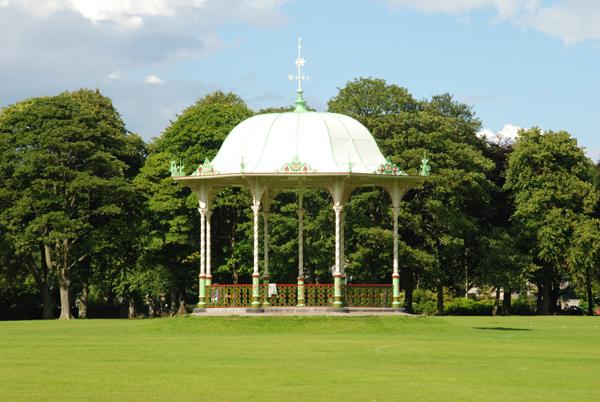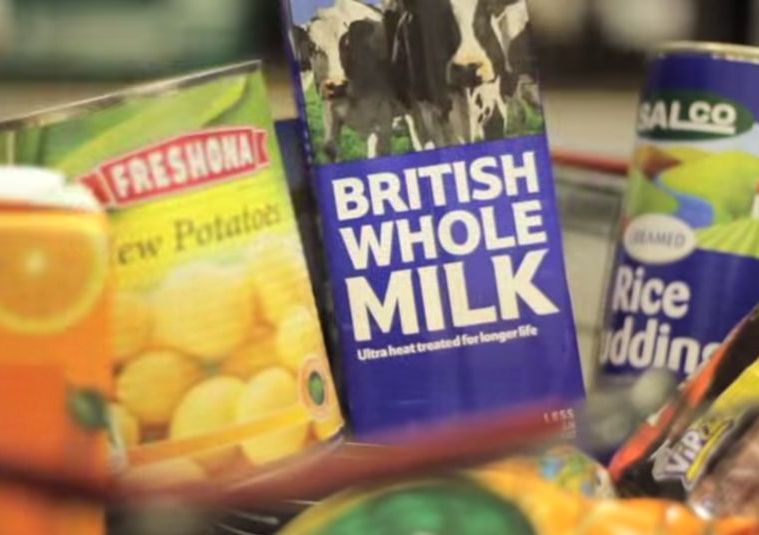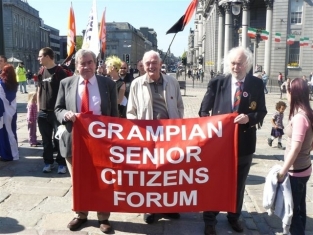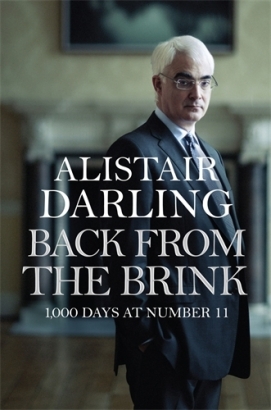Old Susannah watches the latest developments in the ‘Deen and the wider world and helps Voice readers to get their whites right. By Suzanne Kelly.
One of the best events in recent memory? The Party in the Park held by Common Good Aberdeen last Saturday was fantastic, despite the rains. Nearly 4,000 people visited over the course of the day, all of the thousands of home bakes Mrs B created over a course of weeks disappeared long before the day ended, and the shelter of the marquee made the rain a minor inconvenience rather than a show-stopper.
And what a show it was. Gerry Jablonsiki and the Electric Band opened the entertainment, and played an extraordinary set (I must say the solos Gerry comes out with are riveting, but you can’t play like that without a solid rhythm section.
The big surprise for many was the unique, creative duo ‘The Pounding’ whose electronic compositions went over a storm.
The final act of the day were the school choirs performing ‘Sing’. The audience went wild as they danced to Danse MacCabre’s ceildh music.
I was honoured to have been asked to do a speech of thanks at the end; it was a privilege to thank the many volunteers who made the day a success, and Mrs B in particular, without whom this would not have been realised. All around the gardens people commented ‘there should be more events like this’, ‘we don’t need to build anything here, just hold events’ and ‘get me some more of this delicious cake!’
Marie Boulton, Depute ACC Leader, made a brief but wonderful speech; many politicians came out to have fun and talk to their constituents. Everyone was pleased in particular that Dame Anne Begg MP was there, proving that the gardens are accessible. They could be made more accessible it is true – but access does exist, despite odd claims to the contrary.
I would like to apologise for not getting to have proper chats with a number of people, but I was charged with getting the acts on and off stage according to a strict timetable. Neale Bothwell and I did a fair job of it, I think. Don’t wait for someone to throw another event, but when we next do get a dry, sunny day, use your gardens – they are common good land, and you own them.
Another event of this past week was Aberdeen Voice’s 2nd anniversary drinks held in Ma Cameron’s, where the idea for AV was launched.
Members of local band Toxik Ephex had been talking about the need for an independent newspaper, and two years later Fred Wilkinson and a host of volunteers are keeping AV going.
People came and went over the course of the night; we were pleased to see some of the Aberdeen cyclists, a member of the Silver City Surfers, and in particular Anthony Baxter. Baxter has a new version of ‘You’ve Been Trumped’ about to start a UK and North American tour (details elsewhere in Aberdeen Voice) with new footage of The Donald.
All of these positive developments are enough to sap a girl of any sarcasm. Thankfully, there are always a few banking, tax, trident, deer cull scandals to keep me on track. So, without further hesitation, here are a few definitions.
White Cliffs of Dover: (noun, Eng. geography) A steep, dramatic chalk cliff face on the South of England.
The iconic White Cliffs of Dover are in the news this past week; some NIMBYS are objecting to a proposed housing development near them.
The Cliffs also have some problems with erosion, but the main issue of course is that they are not accessible. There is no access for the able-bodied, let alone people with any mobility issues, and to be honest, the connectivity is just not there.
If the cliffs could just be raised (or would that be lowered?) to street level, and a bosque, theatre and parking be thrown in, they might just be onto something there. As to refusing a housing development, well, that would mean that England is not open for business.
Craig Whyte: (Proper Noun, possibly Improper noun) – a colourful character.
Oh dear, could it be that Craig Whyte is not whiter than white? The would-be king of Rangers has had one or two previous problems in the boardroom. This would-be white knight sadly no longer looks set to take over Rangers. Private Eye magazine unkindly suggests that someone with a failed directorship or two is not a fit person for the Rangers role.
Indeed they are correct; Whyte’s considerable talents would be used to best advantage in central government.
To add to this week’s colour theme, it would seem that Green owns the club, but Brown is trying to make the fans see red, and opt for a buyout. Will Rangers ever be in the black again? It is currently a bit of grey area.
Whitewash: (verb, mod English) to cover up bad news, dilute the truth, gloss over facts for political, personal or monetary gain.
Aberdonians and UK taxpayers will be most unfamiliar with this term, and Old Susannah thought you might like to know more about it. It will be difficult, but I shall try and find some examples.
On the national level, there have been one or two little Inquiries which have unjustly been described as being whitewashes.
There was the Hutton Inquiry into the small matter of how a bland dossier about Iraq was magically transformed into a document proving Sadam Hussein was about to use his Weapons of Mass Destruction on the UK, and would only need 45 minutes to wipe us out. This Inquiry found that changing a report into a justification for waging war was a bit naughty, but was fair enough.
No less a person than Alasdair Campbell said he defended ‘every word’ of the ‘sexed-up’ dossier. Why bother to have an Inquiry at all I wonder? If the man who wrote the thing for his boss Tony Blair says it’s above-board, then who are we to question it?
We’ve also had the Levenson Inquiry, a great spectacle for the whole family. One frail little old pensioner, a Mr R Murdoch is cruelly being asked questions about newspaper reporters hacking into phonecalls and emails. The poor Australian gent keeps telling the investigators he can’t remember anything, but they keep asking him questions.
Just because he and his family own the newspapers which carried out the illegal spying is no reason to think he’d know about it or be in any way responsible for it.
Are there any whitewashes going on here in the Deen? Let’s think. The city has been totally transparent over the Tullos Hill deer cull; they pride themselves on their transparency and consultation with the people; quite good of them really.
Freedom of Information requests are answered immediately and clearly. It’s not as if the FOI officers are waiting until the last moment to supply information, or that the information they supply contradicts information they’ve previously released. Surely they have nothing to hide?
Were the city in the right to have guns blazing on a hill used by families, motorcyclists, animals and indeed the occasional free-range arsonist without giving warning? The mainstream press quoted a ‘council spokesperson’ as saying ‘there was no legal requirement’ for any warning signs. Has this whitewash covered the matter sufficiently? We shall see what the public and the authorities think.
White Collar Crime: (Modern English phrase) to commit a non-violent, financial criminal offense.
WE must pause to think of those in our society who are being asked to go without, who are being forced to justify their dependence on State handouts. Yes, I am worried about our banking sector.
We clearly did not give them enough of a bail-out, in fact, they can’t even afford decent IT systems, and some financial institutions are experiencing problems with their electronic banking and cash machines. I do hope none of the bankers will be terribly inconvenienced by people demanding money.
Sometimes however, when forced to the wall, a banker will have no alternative but to turn to crime. It is because we do not have a caring mentality, and because we do not yet have ‘The Big Society’ (whatever that is) which Cameron wants that poor Barclays was forced to what certainly looks like white collar crime.
Unkind authorities are asking for £290,000,000 from the Barclays group for a wee matter of its fixing interest rates. What’s the problem? I thought we wanted fixed interest rates? Unfortunately the bank seems to have given false information about rates it was borrowing money at. Firstly, £290,000,000 is really small change, in fact, it would only get you two granite webs at today’s rates. Secondly, how is a poor bank like Barclay’s going to get its hands on this kind of money?
I think the taxpayer should voluntarily help this poor bank out. After all, if we don’t do so voluntarily, no doubt the treasury will just give them our money anyway. I believe there used to be a commercial with Mr Bean with the repeating phrase ‘Well, thank you BARCLAYCARD!’. Barclays, thank you indeed.
Old Susannah is going to have to cut it there, as she is in Edinburgh – and the sun is out.
Next week: A look at some of the little arguments within Council Chambers.
- Comments enabled – see comments box below. Note, all comments will be moderated.
 With thanks to Dave Macdermid.
With thanks to Dave Macdermid.




